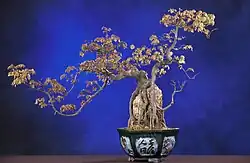bonsai
English

A bonsai maple tree.
Etymology 1
From Japanese 盆栽 (bonsai), from Middle Chinese 盆 (MC bwon, “bowl”) + 栽 (MC tsoj|dzojH, “to plant”).
Pronunciation
- (General American) IPA(key): /ˈbɑnsaɪ/, /ˈbɑnzaɪ/
- (Received Pronunciation) IPA(key): /ˈbɒnsaɪ/
Audio (US) (file)
Verb
bonsai (third-person singular simple present bonsais, present participle bonsaiing, simple past and past participle bonsaied)
- (transitive) To make into a bonsai by restricting the roots and pruning.
- 2001, Dennis Parks, Living in the Country Growing Weird, page 50:
- Could I be a father who was, so to speak, bonsaiing his children, trimming urban roots, and then twisting the emerging branches?
Derived terms
Translations
a miniaturized tree or plant
|
Danish
Noun
bonsai
- (countable) bonsai tree
- (uncountable) art of bonsai
Synonyms
- (tree): bonsaitræ
Finnish
Pronunciation
- IPA(key): /ˈbonsɑi̯/, [ˈbo̞ns̠ɑ̝i̯]
- Rhymes: -onsɑi
- Syllabification(key): bon‧sai
Declension
| Inflection of bonsai (Kotus type 18/maa, no gradation) | ||||
|---|---|---|---|---|
| nominative | bonsai | bonsait | ||
| genitive | bonsain | bonsaiden bonsaitten | ||
| partitive | bonsaita | bonsaita | ||
| illative | bonsaihin | bonsaihin | ||
| singular | plural | |||
| nominative | bonsai | bonsait | ||
| accusative | nom. | bonsai | bonsait | |
| gen. | bonsain | |||
| genitive | bonsain | bonsaiden bonsaitten | ||
| partitive | bonsaita | bonsaita | ||
| inessive | bonsaissa | bonsaissa | ||
| elative | bonsaista | bonsaista | ||
| illative | bonsaihin | bonsaihin | ||
| adessive | bonsailla | bonsailla | ||
| ablative | bonsailta | bonsailta | ||
| allative | bonsaille | bonsaille | ||
| essive | bonsaina | bonsaina | ||
| translative | bonsaiksi | bonsaiksi | ||
| abessive | bonsaitta | bonsaitta | ||
| instructive | — | bonsain | ||
| comitative | See the possessive forms below. | |||
| Possessive forms of bonsai (Kotus type 18/maa, no gradation) | ||||||||||||||||||||||||||||||||||||||||||||||||||||||||||||||||||||||||||||||||||||||||||||||||||||||||||||||||||||||||||||||||||||||||||||||||||||||||||||||||||||||||||||||||||||||||||||||||||||||||||||||||||||||||||||||||||||||||||||||||||||||||||||||||||||||||||||||||||||||||||||||||||||||||||||||||||||||||||||||||||||||||||||||||||||||||||||||
|---|---|---|---|---|---|---|---|---|---|---|---|---|---|---|---|---|---|---|---|---|---|---|---|---|---|---|---|---|---|---|---|---|---|---|---|---|---|---|---|---|---|---|---|---|---|---|---|---|---|---|---|---|---|---|---|---|---|---|---|---|---|---|---|---|---|---|---|---|---|---|---|---|---|---|---|---|---|---|---|---|---|---|---|---|---|---|---|---|---|---|---|---|---|---|---|---|---|---|---|---|---|---|---|---|---|---|---|---|---|---|---|---|---|---|---|---|---|---|---|---|---|---|---|---|---|---|---|---|---|---|---|---|---|---|---|---|---|---|---|---|---|---|---|---|---|---|---|---|---|---|---|---|---|---|---|---|---|---|---|---|---|---|---|---|---|---|---|---|---|---|---|---|---|---|---|---|---|---|---|---|---|---|---|---|---|---|---|---|---|---|---|---|---|---|---|---|---|---|---|---|---|---|---|---|---|---|---|---|---|---|---|---|---|---|---|---|---|---|---|---|---|---|---|---|---|---|---|---|---|---|---|---|---|---|---|---|---|---|---|---|---|---|---|---|---|---|---|---|---|---|---|---|---|---|---|---|---|---|---|---|---|---|---|---|---|---|---|---|---|---|---|---|---|---|---|---|---|---|---|---|---|---|---|---|---|---|---|---|---|---|---|---|---|---|---|---|---|---|---|---|---|---|---|---|---|---|---|---|---|---|---|---|---|---|---|---|---|---|---|---|---|---|---|---|---|---|---|---|---|---|---|---|---|---|---|---|---|---|---|---|---|---|---|---|---|---|---|---|---|---|
| ||||||||||||||||||||||||||||||||||||||||||||||||||||||||||||||||||||||||||||||||||||||||||||||||||||||||||||||||||||||||||||||||||||||||||||||||||||||||||||||||||||||||||||||||||||||||||||||||||||||||||||||||||||||||||||||||||||||||||||||||||||||||||||||||||||||||||||||||||||||||||||||||||||||||||||||||||||||||||||||||||||||||||||||||||||||||||||||
Further reading
- “bonsai”, in Kielitoimiston sanakirja [Dictionary of Contemporary Finnish] (in Finnish) (online dictionary, continuously updated), Kotimaisten kielten keskuksen verkkojulkaisuja 35, Helsinki: Kotimaisten kielten tutkimuskeskus (Institute for the Languages of Finland), 2004–, retrieved 2023-07-02
Indonesian

bonsai
Etymology
From Japanese 盆栽 (bonsai), from Middle Chinese 盆 (MC bwon, “bowl”) + 栽 (MC tsoj|dzojH, “to plant”).
Pronunciation
- IPA(key): [ˈbɔnsai̯]
- Hyphenation: bon‧sai
Noun
bonsai (first-person possessive bonsaiku, second-person possessive bonsaimu, third-person possessive bonsainya)
Alternative forms
- bongsai
Derived terms
- membonsai
- membonsaikan
- pebonsai
- pembonsaian
Further reading
- “bonsai” in Kamus Besar Bahasa Indonesia, Jakarta: Agency for Language Development and Cultivation – Ministry of Education, Culture, Research, and Technology of the Republic of Indonesia, 2016.
Polish
Pronunciation
- IPA(key): /ˈbɔn.saj/
Audio (file) - Rhymes: -ɔnsaj
- Syllabification: bon‧sai
Further reading
- bonsai in Polish dictionaries at PWN
Portuguese
Spanish
Pronunciation
- IPA(key): /ˈbonsai/ [ˈbõn.sai̯]
- Rhymes: -onsai
- Syllabification: bon‧sai
This article is issued from Wiktionary. The text is licensed under Creative Commons - Attribution - Sharealike. Additional terms may apply for the media files.